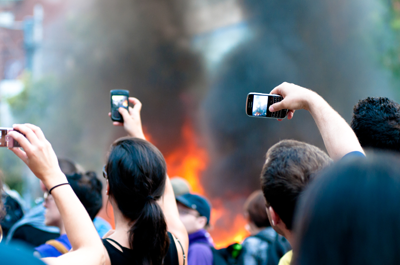Study of Toronto G20 summit examines civil rights, role of social media

When Toronto hosted the G20 leaders' summit in June 2010, the event – and the protests surrounding it – left behind unforgettable images and memories. Police cars were set ablaze, officers in riot gear filled the streets, property was damaged and the largest mass arrest in Canadian history occurred. According to one Ryerson researcher, though, while the incidents of the G20 were shocking, they also weren't unexpected.
"Given the protocols that have been adopted by the police when it comes to events like the G20 and the Olympics, people really shouldn't have been surprised by what happened in Toronto," says Greg Elmer, a Bell Globemedia Research Chair and director of Ryerson's Infoscape Centre for the Study of Social Media.
As proof, Elmer points to the increased use of heavy militarized police units during political protests and the efforts of law enforcement agencies to encircle or "kettle" protesters. The latter tactic leaves demonstrators with no exit, and according to critics, can incite once-peaceful protesters to retaliate.
Elmer, in fact, is exploring a number of issues related to political protests. Last fall, for example, saw the release of his latest book Infrastructure Critical: Sacrifice at Toronto's G8/20 Summit. Co-authored by former Infoscape postdoctoral researcher Alessandra Renzi, Infrastructure Critical argues that the Canadian government portrayed Toronto's financial district as being at risk from domestic threats as a way to justify the policing of peaceful protesters and members of the so-called "black bloc" during the G20.
Elmer is also analyzing the events of the G20 in a new, feature-length documentary film. Co-produced by Andy Opel of Florida State University, Preempting Dissent: Policing the Crisis is an extension of the researchers' 2008 scholarly book of the same name, and is funded by the Social Sciences and Humanities Research Council of Canada.
In their film, Elmer and Opel look at the impact of policing strategies on civil rights, as well as freedom of speech and assembly. The film argues that restricting protesters to certain zones, constructing security fences and Ontario's controversial passing of a "World War II-era law" designed to protect public infrastructure were all used by law enforcement agencies to stifle dissent during the G20 summit.
The researchers are also studying the role of social media in protest movements. To that end, Preempting Dissent is composed of cell phone videos, camera footage, personal testimonials and interviews that were shot and uploaded by dozens of citizen journalists, activists and artists. Clips from the film are stored in an open-source database and will be made available for other people to incorporate into their own documentaries.
"There's wide recognition that social media is good for interactivity and participation in debates, but we wanted to question the idea of 'sharing,'" says Elmer. "What content is actually being shared? What is being held back? Also, when are people sharing the content and where are they posting it?"
Elmer and Opel aim to complete Preempting Dissent by the summer. Around the same time, Elmer will also begin a one-year fellowship at the Department of Media and Communication at Goldsmiths College, University of London. The appointment, he says, will enable additional screenings of Preempting Dissent.
Provided by Ryerson University


















